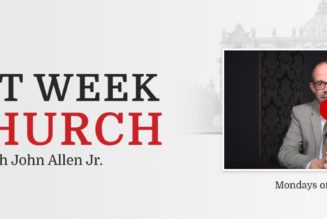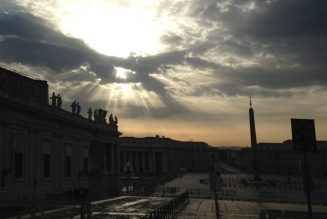Converts are neither perfect nor infallible. But our experiences for good and for ill are gifts that are useful for the Church’s life. Taking them into account might help the discussions about the realities of the Church’s past, present, and future.
 As an adult convert to the Catholic faith of long standing (I came into the Church in 1997 at the tender age of 23), I am very grateful for the completion of the faith first given to me in baptism in a Christian Reformed Church in 1978. For most of my life as a Catholic I have experienced both love and admiration from cradle Catholics. While I’m happy to take the love, sometimes the admiration makes me a bit nervous.
As an adult convert to the Catholic faith of long standing (I came into the Church in 1997 at the tender age of 23), I am very grateful for the completion of the faith first given to me in baptism in a Christian Reformed Church in 1978. For most of my life as a Catholic I have experienced both love and admiration from cradle Catholics. While I’m happy to take the love, sometimes the admiration makes me a bit nervous.
I think of myself as the convert novelist Walker Percy did—a bad Catholic at the end of the world. I’m certainly no saint. Though (or perhaps because) I have a doctorate in theology and have taught, spoken, and written about the faith for many years, I’ve never thought of myself as first in the Kingdom of Heaven. If anything, I have long had the distinct fear that the Final Judgment will be delayed because I’ve been taking so long in Purgatory. Conversion is a turning toward the Lord and, even for the adult who comes into the Church after study and prayer, it is a process that takes a whole lifetime.
But even if being an adult convert doesn’t make holiness instantaneous, I have to say that there are some particular advantages to having embraced the faith after an intellectual and spiritual journey. Some of them are quite obvious. Most people remark on the fact that converts have often read not only a lot of the Bible but also a great many Catholic teaching documents and spiritual writings. They have also learned how to explain Catholic faith in a logical and orderly manner. This is generally true because the convert has not only had to explain the faith to himself but also to skeptical others who wonder how anybody could join this body.
But there are other benefits to being a convert. One of the most important ones is that a convert is acutely aware of how certain theological decisions affect Christian life and belief. Though many liberal Catholics like to say that those who hold to the Catholic Church’s perennial teaching are “fundamentalists,” converts understand that these so-called liberals are themselves victims of what the late Fr. Richard John Neuhaus (himself a former Lutheran) called “ecclesial fundamentalism.” Ecclesial fundamentalism is the belief that because the Catholic Church is the true Church, she can do anything and continue to thrive. Usually what liberal Catholic fundamentalists focus on is changing the Church’s teaching on sexuality, abortion, and the ordination of women, but some want to get rid of other theological teachings. And they usually claim that such change is necessary to keep people from leaving the Church and attract others to her.
The convert understands from experience that there isn’t much evidence that changing teachings that are difficult makes Christian faith more palatable or popular. Converts often were part of churches or ecclesial communities that changed theological and moral teachings to match what the secular world would accept. We know that these changes did not make faith any easier or more attractive. Quite the opposite. Many of us saw congregations and denominations shrink very quickly once they had made these changes.
Further, the convert understands that this is not just because those other Christian groups were not in union with the Catholic Church. The convert understands that the Catholic Church can’t make these changes and thrive either—because those teachings are not hers to change any way people want. They are not “policies” that are subject to either the will of the leaders or the majority. They are what Christ has revealed. They are testified to in Scripture and Tradition. They form part of a whole that can’t simply be taken apart without doing damage to the entire Catholic faith.
So-called liberal Catholics often accuse converts of being anti-ecumenical because of their devotion to holding to the full Catholic teachings. Such converts are said to be too narrow to appreciate those who are outside her fold. I have generally not found this to be true. St. John Henry Newman argued that the Church’s dogmatic nature is why she could be so eclectic in drawing what was good from heretical groups and even pagan religions. It is often because converts have embraced the fullness of Catholic teachings after a search for the truth that they can better appreciate what is good and imitable in other Christians’ beliefs and practices—while also understanding the ins and outs of non-Catholic groups. While many Protestant groups often have worship and a hierarchical structure that look Catholic, they operate on very different principles than the Catholic Church does.
If converts have been given some gifts that are helpful in dealing with temptations that so-called liberals deal with, they have also been given some that are helpful in dealing with the kinds of temptations to which Catholics who care about orthodoxy are prone. Most importantly, converts who have studied the Church’s history know that though it is glorious, that glory has been accompanied by a lot of muck. For many converts, it was dealing with the most difficult parts of the Church’s history that proved to us that Christ is guiding her.
While we are not happy about the corruption and the decay in the Church that we see now, we know that the history of decay and corruption in the Church is perennial. We know about the difficulties of bad lay Catholics, monks, priests, bishops, and popes who have littered our history. We know about the times when the Church has seemingly been almost dead and miraculously been brought back to health. It is perhaps a fair criticism to say that some converts see the Church with rose-colored glasses when they first enter. It’s also true to say that some can present the Church in that rosy fashion. Perhaps the best service they can offer to the Church is their own struggle with some of the darker sides of the Church’s history—and why they decided she is Christ’s Church all the same.
Converts are neither perfect nor infallible. But our experiences for good and for ill are gifts that are useful for the Church’s life. Taking them into account might help the discussions about the realities of the Church’s past, present, and future.
Republished with gracious permission from The Catholic Servant.
The Imaginative Conservative applies the principle of appreciation to the discussion of culture and politics—we approach dialogue with magnanimity rather than with mere civility. Will you help us remain a refreshing oasis in the increasingly contentious arena of modern discourse? Please consider donating now.
The featured image is “High Mass at a Fishing Village on the Zuyder Zee, Holland” (1876) by George Clausen, and is in the public domain, courtesy of Wikimedia Commons.
Share This Story, Choose Your Platform!
body{–wp–preset–color–black: #000000;–wp–preset–color–cyan-bluish-gray: #abb8c3;–wp–preset–color–white: #ffffff;–wp–preset–color–pale-pink: #f78da7;–wp–preset–color–vivid-red: #cf2e2e;–wp–preset–color–luminous-vivid-orange: #ff6900;–wp–preset–color–luminous-vivid-amber: #fcb900;–wp–preset–color–light-green-cyan: #7bdcb5;–wp–preset–color–vivid-green-cyan: #00d084;–wp–preset–color–pale-cyan-blue: #8ed1fc;–wp–preset–color–vivid-cyan-blue: #0693e3;–wp–preset–color–vivid-purple: #9b51e0;–wp–preset–color–awb-color-1: rgba(255,255,255,1);–wp–preset–color–awb-color-2: rgba(246,246,246,1);–wp–preset–color–awb-color-3: rgba(224,222,222,1);–wp–preset–color–awb-color-4: rgba(233,168,37,1);–wp–preset–color–awb-color-5: rgba(116,116,116,1);–wp–preset–color–awb-color-6: rgba(120,85,16,1);–wp–preset–color–awb-color-7: rgba(62,62,62,1);–wp–preset–color–awb-color-8: rgba(51,51,51,1);–wp–preset–color–awb-color-custom-10: rgba(174,137,93,1);–wp–preset–color–awb-color-custom-11: rgba(192,153,107,1);–wp–preset–color–awb-color-custom-12: rgba(190,189,189,1);–wp–preset–color–awb-color-custom-13: rgba(62,62,62,0.8);–wp–preset–color–awb-color-custom-14: rgba(68,68,68,1);–wp–preset–color–awb-color-custom-15: rgba(221,221,221,1);–wp–preset–color–awb-color-custom-16: rgba(232,232,232,1);–wp–preset–color–awb-color-custom-17: rgba(249,249,249,1);–wp–preset–color–awb-color-custom-18: rgba(229,229,229,1);–wp–preset–gradient–vivid-cyan-blue-to-vivid-purple: linear-gradient(135deg,rgba(6,147,227,1) 0%,rgb(155,81,224) 100%);–wp–preset–gradient–light-green-cyan-to-vivid-green-cyan: linear-gradient(135deg,rgb(122,220,180) 0%,rgb(0,208,130) 100%);–wp–preset–gradient–luminous-vivid-amber-to-luminous-vivid-orange: linear-gradient(135deg,rgba(252,185,0,1) 0%,rgba(255,105,0,1) 100%);–wp–preset–gradient–luminous-vivid-orange-to-vivid-red: linear-gradient(135deg,rgba(255,105,0,1) 0%,rgb(207,46,46) 100%);–wp–preset–gradient–very-light-gray-to-cyan-bluish-gray: linear-gradient(135deg,rgb(238,238,238) 0%,rgb(169,184,195) 100%);–wp–preset–gradient–cool-to-warm-spectrum: linear-gradient(135deg,rgb(74,234,220) 0%,rgb(151,120,209) 20%,rgb(207,42,186) 40%,rgb(238,44,130) 60%,rgb(251,105,98) 80%,rgb(254,248,76) 100%);–wp–preset–gradient–blush-light-purple: linear-gradient(135deg,rgb(255,206,236) 0%,rgb(152,150,240) 100%);–wp–preset–gradient–blush-bordeaux: linear-gradient(135deg,rgb(254,205,165) 0%,rgb(254,45,45) 50%,rgb(107,0,62) 100%);–wp–preset–gradient–luminous-dusk: linear-gradient(135deg,rgb(255,203,112) 0%,rgb(199,81,192) 50%,rgb(65,88,208) 100%);–wp–preset–gradient–pale-ocean: linear-gradient(135deg,rgb(255,245,203) 0%,rgb(182,227,212) 50%,rgb(51,167,181) 100%);–wp–preset–gradient–electric-grass: linear-gradient(135deg,rgb(202,248,128) 0%,rgb(113,206,126) 100%);–wp–preset–gradient–midnight: linear-gradient(135deg,rgb(2,3,129) 0%,rgb(40,116,252) 100%);–wp–preset–font-size–small: 11.25px;–wp–preset–font-size–medium: 20px;–wp–preset–font-size–large: 22.5px;–wp–preset–font-size–x-large: 42px;–wp–preset–font-size–normal: 15px;–wp–preset–font-size–xlarge: 30px;–wp–preset–font-size–huge: 45px;–wp–preset–spacing–20: 0.44rem;–wp–preset–spacing–30: 0.67rem;–wp–preset–spacing–40: 1rem;–wp–preset–spacing–50: 1.5rem;–wp–preset–spacing–60: 2.25rem;–wp–preset–spacing–70: 3.38rem;–wp–preset–spacing–80: 5.06rem;–wp–preset–shadow–natural: 6px 6px 9px rgba(0, 0, 0, 0.2);–wp–preset–shadow–deep: 12px 12px 50px rgba(0, 0, 0, 0.4);–wp–preset–shadow–sharp: 6px 6px 0px rgba(0, 0, 0, 0.2);–wp–preset–shadow–outlined: 6px 6px 0px -3px rgba(255, 255, 255, 1), 6px 6px rgba(0, 0, 0, 1);–wp–preset–shadow–crisp: 6px 6px 0px rgba(0, 0, 0, 1);}:where(.is-layout-flex){gap: 0.5em;}:where(.is-layout-grid){gap: 0.5em;}body .is-layout-flow > .alignleft{float: left;margin-inline-start: 0;margin-inline-end: 2em;}body .is-layout-flow > .alignright{float: right;margin-inline-start: 2em;margin-inline-end: 0;}body .is-layout-flow > .aligncenter{margin-left: auto !important;margin-right: auto !important;}body .is-layout-constrained > .alignleft{float: left;margin-inline-start: 0;margin-inline-end: 2em;}body .is-layout-constrained > .alignright{float: right;margin-inline-start: 2em;margin-inline-end: 0;}body .is-layout-constrained > .aligncenter{margin-left: auto !important;margin-right: auto !important;}body .is-layout-constrained > :where(:not(.alignleft):not(.alignright):not(.alignfull)){max-width: var(–wp–style–global–content-size);margin-left: auto !important;margin-right: auto !important;}body .is-layout-constrained > .alignwide{max-width: var(–wp–style–global–wide-size);}body .is-layout-flex{display: flex;}body .is-layout-flex{flex-wrap: wrap;align-items: center;}body .is-layout-flex > *{margin: 0;}body .is-layout-grid{display: grid;}body .is-layout-grid > *{margin: 0;}:where(.wp-block-columns.is-layout-flex){gap: 2em;}:where(.wp-block-columns.is-layout-grid){gap: 2em;}:where(.wp-block-post-template.is-layout-flex){gap: 1.25em;}:where(.wp-block-post-template.is-layout-grid){gap: 1.25em;}.has-black-color{color: var(–wp–preset–color–black) !important;}.has-cyan-bluish-gray-color{color: var(–wp–preset–color–cyan-bluish-gray) !important;}.has-white-color{color: var(–wp–preset–color–white) !important;}.has-pale-pink-color{color: var(–wp–preset–color–pale-pink) !important;}.has-vivid-red-color{color: var(–wp–preset–color–vivid-red) !important;}.has-luminous-vivid-orange-color{color: var(–wp–preset–color–luminous-vivid-orange) !important;}.has-luminous-vivid-amber-color{color: var(–wp–preset–color–luminous-vivid-amber) !important;}.has-light-green-cyan-color{color: var(–wp–preset–color–light-green-cyan) !important;}.has-vivid-green-cyan-color{color: var(–wp–preset–color–vivid-green-cyan) !important;}.has-pale-cyan-blue-color{color: var(–wp–preset–color–pale-cyan-blue) !important;}.has-vivid-cyan-blue-color{color: var(–wp–preset–color–vivid-cyan-blue) !important;}.has-vivid-purple-color{color: var(–wp–preset–color–vivid-purple) !important;}.has-black-background-color{background-color: var(–wp–preset–color–black) !important;}.has-cyan-bluish-gray-background-color{background-color: var(–wp–preset–color–cyan-bluish-gray) !important;}.has-white-background-color{background-color: var(–wp–preset–color–white) !important;}.has-pale-pink-background-color{background-color: var(–wp–preset–color–pale-pink) !important;}.has-vivid-red-background-color{background-color: var(–wp–preset–color–vivid-red) !important;}.has-luminous-vivid-orange-background-color{background-color: var(–wp–preset–color–luminous-vivid-orange) !important;}.has-luminous-vivid-amber-background-color{background-color: var(–wp–preset–color–luminous-vivid-amber) !important;}.has-light-green-cyan-background-color{background-color: var(–wp–preset–color–light-green-cyan) !important;}.has-vivid-green-cyan-background-color{background-color: var(–wp–preset–color–vivid-green-cyan) !important;}.has-pale-cyan-blue-background-color{background-color: var(–wp–preset–color–pale-cyan-blue) !important;}.has-vivid-cyan-blue-background-color{background-color: var(–wp–preset–color–vivid-cyan-blue) !important;}.has-vivid-purple-background-color{background-color: var(–wp–preset–color–vivid-purple) !important;}.has-black-border-color{border-color: var(–wp–preset–color–black) !important;}.has-cyan-bluish-gray-border-color{border-color: var(–wp–preset–color–cyan-bluish-gray) !important;}.has-white-border-color{border-color: var(–wp–preset–color–white) !important;}.has-pale-pink-border-color{border-color: var(–wp–preset–color–pale-pink) !important;}.has-vivid-red-border-color{border-color: var(–wp–preset–color–vivid-red) !important;}.has-luminous-vivid-orange-border-color{border-color: var(–wp–preset–color–luminous-vivid-orange) !important;}.has-luminous-vivid-amber-border-color{border-color: var(–wp–preset–color–luminous-vivid-amber) !important;}.has-light-green-cyan-border-color{border-color: var(–wp–preset–color–light-green-cyan) !important;}.has-vivid-green-cyan-border-color{border-color: var(–wp–preset–color–vivid-green-cyan) !important;}.has-pale-cyan-blue-border-color{border-color: var(–wp–preset–color–pale-cyan-blue) !important;}.has-vivid-cyan-blue-border-color{border-color: var(–wp–preset–color–vivid-cyan-blue) !important;}.has-vivid-purple-border-color{border-color: var(–wp–preset–color–vivid-purple) !important;}.has-vivid-cyan-blue-to-vivid-purple-gradient-background{background: var(–wp–preset–gradient–vivid-cyan-blue-to-vivid-purple) !important;}.has-light-green-cyan-to-vivid-green-cyan-gradient-background{background: var(–wp–preset–gradient–light-green-cyan-to-vivid-green-cyan) !important;}.has-luminous-vivid-amber-to-luminous-vivid-orange-gradient-background{background: var(–wp–preset–gradient–luminous-vivid-amber-to-luminous-vivid-orange) !important;}.has-luminous-vivid-orange-to-vivid-red-gradient-background{background: var(–wp–preset–gradient–luminous-vivid-orange-to-vivid-red) !important;}.has-very-light-gray-to-cyan-bluish-gray-gradient-background{background: var(–wp–preset–gradient–very-light-gray-to-cyan-bluish-gray) !important;}.has-cool-to-warm-spectrum-gradient-background{background: var(–wp–preset–gradient–cool-to-warm-spectrum) !important;}.has-blush-light-purple-gradient-background{background: var(–wp–preset–gradient–blush-light-purple) !important;}.has-blush-bordeaux-gradient-background{background: var(–wp–preset–gradient–blush-bordeaux) !important;}.has-luminous-dusk-gradient-background{background: var(–wp–preset–gradient–luminous-dusk) !important;}.has-pale-ocean-gradient-background{background: var(–wp–preset–gradient–pale-ocean) !important;}.has-electric-grass-gradient-background{background: var(–wp–preset–gradient–electric-grass) !important;}.has-midnight-gradient-background{background: var(–wp–preset–gradient–midnight) !important;}.has-small-font-size{font-size: var(–wp–preset–font-size–small) !important;}.has-medium-font-size{font-size: var(–wp–preset–font-size–medium) !important;}.has-large-font-size{font-size: var(–wp–preset–font-size–large) !important;}.has-x-large-font-size{font-size: var(–wp–preset–font-size–x-large) !important;}
.wp-block-navigation a:where(:not(.wp-element-button)){color: inherit;}
:where(.wp-block-post-template.is-layout-flex){gap: 1.25em;}:where(.wp-block-post-template.is-layout-grid){gap: 1.25em;}
:where(.wp-block-columns.is-layout-flex){gap: 2em;}:where(.wp-block-columns.is-layout-grid){gap: 2em;}
.wp-block-pullquote{font-size: 1.5em;line-height: 1.6;}
.has-text-align-justify{text-align:justify;}
.wp-block-audio figcaption{color:#555;font-size:13px;text-align:center}.is-dark-theme .wp-block-audio figcaption{color:hsla(0,0%,100%,.65)}.wp-block-audio{margin:0 0 1em}.wp-block-code{border:1px solid #ccc;border-radius:4px;font-family:Menlo,Consolas,monaco,monospace;padding:.8em 1em}.wp-block-embed figcaption{color:#555;font-size:13px;text-align:center}.is-dark-theme .wp-block-embed figcaption{color:hsla(0,0%,100%,.65)}.wp-block-embed{margin:0 0 1em}.blocks-gallery-caption{color:#555;font-size:13px;text-align:center}.is-dark-theme .blocks-gallery-caption{color:hsla(0,0%,100%,.65)}.wp-block-image figcaption{color:#555;font-size:13px;text-align:center}.is-dark-theme .wp-block-image figcaption{color:hsla(0,0%,100%,.65)}.wp-block-image{margin:0 0 1em}.wp-block-pullquote{border-bottom:4px solid;border-top:4px solid;color:currentColor;margin-bottom:1.75em}.wp-block-pullquote cite,.wp-block-pullquote footer,.wp-block-pullquote__citation{color:currentColor;font-size:.8125em;font-style:normal;text-transform:uppercase}.wp-block-quote{border-left:.25em solid;margin:0 0 1.75em;padding-left:1em}.wp-block-quote cite,.wp-block-quote footer{color:currentColor;font-size:.8125em;font-style:normal;position:relative}.wp-block-quote.has-text-align-right{border-left:none;border-right:.25em solid;padding-left:0;padding-right:1em}.wp-block-quote.has-text-align-center{border:none;padding-left:0}.wp-block-quote.is-large,.wp-block-quote.is-style-large,.wp-block-quote.is-style-plain{border:none}.wp-block-search .wp-block-search__label{font-weight:700}.wp-block-search__button{border:1px solid #ccc;padding:.375em .625em}:where(.wp-block-group.has-background){padding:1.25em 2.375em}.wp-block-separator.has-css-opacity{opacity:.4}.wp-block-separator{border:none;border-bottom:2px solid;margin-left:auto;margin-right:auto}.wp-block-separator.has-alpha-channel-opacity{opacity:1}.wp-block-separator:not(.is-style-wide):not(.is-style-dots){width:100px}.wp-block-separator.has-background:not(.is-style-dots){border-bottom:none;height:1px}.wp-block-separator.has-background:not(.is-style-wide):not(.is-style-dots){height:2px}.wp-block-table{margin:0 0 1em}.wp-block-table td,.wp-block-table th{word-break:normal}.wp-block-table figcaption{color:#555;font-size:13px;text-align:center}.is-dark-theme .wp-block-table figcaption{color:hsla(0,0%,100%,.65)}.wp-block-video figcaption{color:#555;font-size:13px;text-align:center}.is-dark-theme .wp-block-video figcaption{color:hsla(0,0%,100%,.65)}.wp-block-video{margin:0 0 1em}.wp-block-template-part.has-background{margin-bottom:0;margin-top:0;padding:1.25em 2.375em}
/*! This file is auto-generated */
.wp-block-button__link{color:#fff;background-color:#32373c;border-radius:9999px;box-shadow:none;text-decoration:none;padding:calc(.667em + 2px) calc(1.333em + 2px);font-size:1.125em}.wp-block-file__button{background:#32373c;color:#fff;text-decoration:none}









